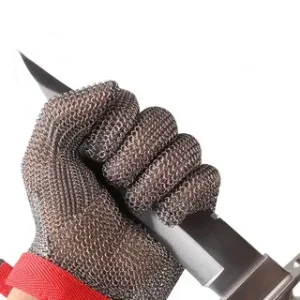The Role of Safety Gloves in the UK Meat Industry
The UK meat processing sector is one of the most demanding work environments, with butchers and slaughterhouse staff operating in fast-paced, high-risk conditions where accidents can happen in seconds. With sharp knives, mechanical slicers, and heavy carcasses being handled daily, the importance of wearing meat industry safety gloves is undeniable.
Whether butchers are working with Victorinox knives, Dick knives, Giesser knives, or automated cutting machinery, ensuring optimal hand protection is key to preventing serious injuries while maintaining efficiency.
Among the various glove options available, butcher chainmail gloves, steel mesh gloves, and cut-resistant gloves remain industry staples, each offering unique advantages suited to different tasks.
But how do they compare, and are chain gloves really necessary for all meat processing jobs?
What Are Chain Mesh Gloves UK?
Chain mesh gloves, also known as butcher chainmail gloves, are a key protective tool for high-risk cutting and slicing tasks. Constructed from interlocking stainless steel rings, they provide maximum defence against sharp blades and cutting accidents, making them ideal for slaughterhouse work.
Key Features of Chain Mesh Gloves UK:
- Superior cut resistance – Protects against deep wounds from meat-cutting knife tools.
- Highly durable stainless steel – Provides long-lasting performance, even under frequent use.
- Adjustable wrist straps for comfort – Ensures a snug yet flexible fit, preventing movement restrictions.
- Easy sanitation and hygiene compliance – Stainless steel allows thorough washing and disinfection after each use.
These gloves are commonly used in abattoirs, industrial meat processing plants, and butcher shops, where blade safety is a top priority.
Steel Gloves vs. Cut-Resistant Gloves
While steel gloves offer maximum protection, not all meat processing roles require full metal coverage. Some butchers and processing staff prefer cut-resistant gloves, which provide greater dexterity while still offering protection against minor injuries.
Steel Gloves – When They’re the Best Choice:
- Used for bone processing and carcass breakdown – Handles high-risk cutting tasks.
- Ideal for repetitive motion work with large knives – Reduces hand fatigue while maintaining defence against blades.
- Ensures compliance with safety regulations – Widely used in slaughterhouses and high-risk processing plants.
Cut Resistant Gloves – When Flexibility Is Key:
- Provides a balance between protection and agility – Suitable for retail butchery and finer cuts.
- Lightweight fabric allows precise knife movements – Helps with filleting, trimming, and portioning meats.
- More breathable than steel gloves – Reduces sweating and discomfort in warm environments.
Choosing between steel gloves and cut-resistant gloves depends on the level of risk involved in specific meat processing tasks.
Butchers’ Knives & Cutting Tools – Choosing the Best
Regardless of glove choice, the quality of butchers’ knives is crucial for precision, efficiency, and long-term usability. Using poor-quality blades can increase risk, making protective gloves even more necessary.
Leading Butcher Knife Brands in the UK:
- Victorinox knives – Favoured for their razor-sharp edges and ergonomic designs, enhancing comfort during long hours of use.
- Dick knives – Known for their durability, high-carbon steel composition, and professional-grade sharpness.
- Giesser knives – Provide superior grip and cutting accuracy, reducing errors in meat portioning and trimming.
Pairing top-tier butchers’ knives with the right safety gloves guarantees efficiency and risk reduction in meat processing environments.
Bekina Steplite & Dunlop Purofort Wellies – Essential Foot Protection
Alongside hand protection, ensuring proper meat plant footwear is critical for reducing accidents caused by slips, falls, and contamination.
Industry-Standard Work Boots for Butchers:
- Bekina Steplite – Lightweight, insulated, and fully waterproof to withstand wet slaughterhouse floors.
- Dunlop Purofort Wellies – Slip-resistant soles and reinforced grip provide protection against fat-covered surfaces and cold storage conditions.
Combining the right gloves and footwear enhances overall safety, reducing both hand and foot-related injuries in high-risk environments.
Selecting the Right Boots for Different Meat Processing Roles
Different roles within meat plants require specialised footwear features to meet specific workplace conditions.
Best Footwear for Various Meat Industry Jobs:
- Slaughter line workers – Need steel-toe-capped boots, chemical-resistant soles, and waterproof insulation for handling heavy carcasses and liquid runoff.
- Retail butchers – Benefit from ergonomic wellies with soft insoles for extended standing periods.
- Processing plant staff – Require anti-slip footwear resistant to cleaning chemicals and hygiene regulations.
Choosing safety boots suited to each job ensures maximum protection without sacrificing mobility.
Cleaning and Maintaining Safety Gloves & Boots for Maximum Lifespan
Proper maintenance and cleaning of safety gloves and boots significantly impact hygiene, functionality, and longevity.
How to Properly Maintain Protective Equipment:
- Regular deep cleaning of steel gloves – Removes blood, fat, and bacteria, preventing contamination.
- Sanitisation stations for gloves and boots – Helps comply with UK health regulations in meat plants.
- Boot sole inspections – Checking for grip deterioration prevents slips and accidents.
Implementing strict hygiene protocols ensures worker safety and compliance with industry standards.
Preventing Hand & Foot Fatigue in Slaughterhouse Workspaces
Workers in butcher shops and meat plants spend long hours on their feet, making ergonomic gloves and footwear essential for preventing fatigue and long-term injuries.
Best Practices to Reduce Fatigue:
- Shock-absorbing boots – Lightweight Bekina Steplite wellies reduce joint stress and muscle strain.
- Gel-padded insoles – Provide extra cushioning, preventing aches during long-standing shifts.
- Alternating gloves throughout shifts – Switching between steel gloves and cut-resistant gloves prevents excessive hand strain.
Prioritising comfort and ergonomic protection ensures greater efficiency and fewer work-related injuries.
Industry Regulations & Compliance for Hand Protection in the UK Meat Industry
Meat processing facilities in the UK must adhere to strict safety regulations, ensuring workers wear proper protective gloves to reduce risk and comply with industry laws.
Key UK Regulations for Hand Protection in Meat Plants:
- Health and Safety Executive (HSE) Guidelines – Mandates the use of cut-resistant gloves or chain gloves in high-risk processing tasks.
- Food Standards Agency (FSA) Compliance – Requires gloves to be sanitised regularly to prevent contamination risks.
- British Safety Standards for Protective Gloves – Ensures all gloves meet EN 1082-1 regulations for meat processing environments.
Companies that fail to comply with safety equipment regulations risk fines, legal action, and increased workplace injuries.
PPE is Paramount
Safety gloves are one of the most critical protective tools in the UK meat industry, allowing workers to operate efficiently while preventing serious injuries.
Steel gloves UK, butcher chainmail gloves, and chain gloves provide the highest level of protection against sharp knives, slicers, and mechanical hazards, while cut-resistant gloves offer flexibility for precision cutting tasks.
SUMMARY
Paired with Bekina Steplite wellies, Dunlop Purofort Wellies, high-quality butchers’ knives, and strict hygiene protocols, proper safety gear ensures worker comfort, regulatory compliance, and long-term accident prevention.
For butchers and meat plant workers searching for the best safety gloves, protective footwear, and cutting tools, investing in industry-approved equipment guarantees a safer, more efficient workspace that meets UK health and safety standards.





